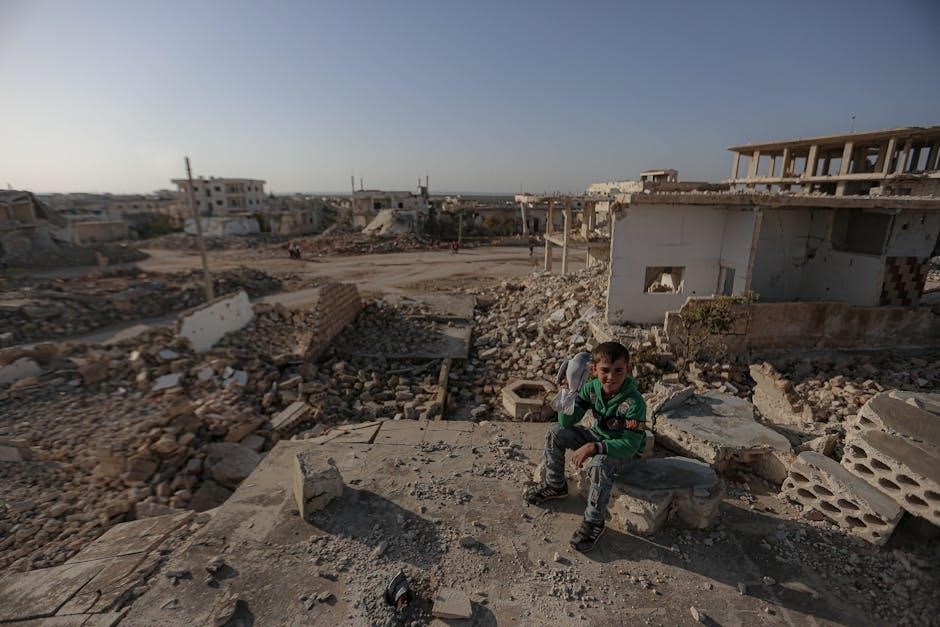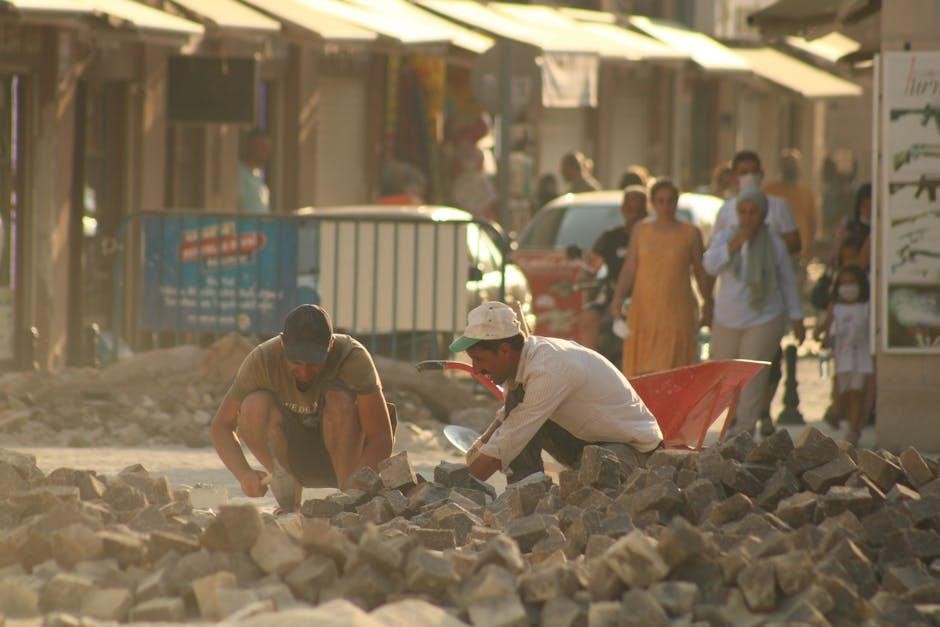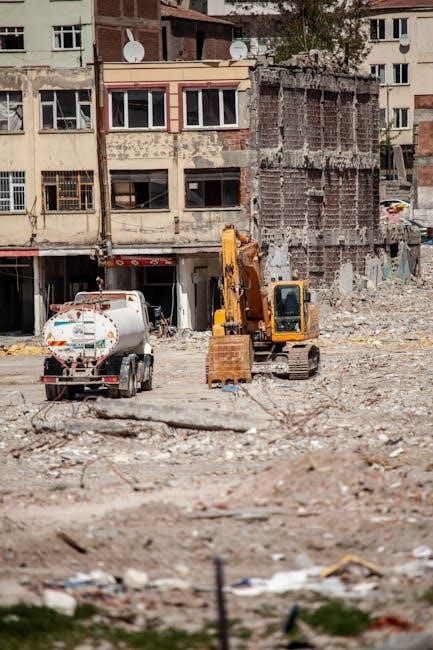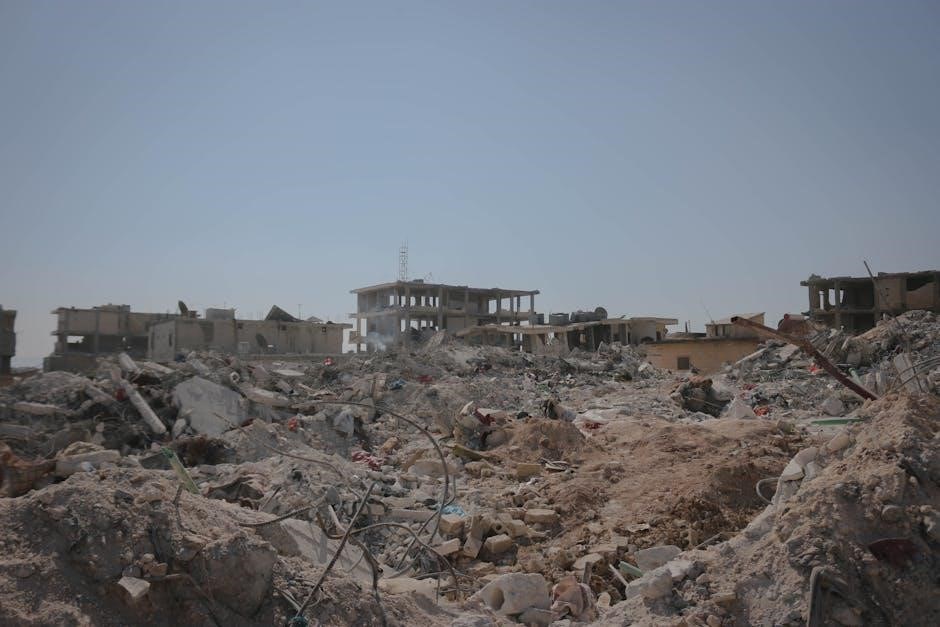
Rebuilding civilization requires a comprehensive guide, like The Ultimate Guide to Rebuilding Civilization, which outlines survival basics, technological advancements, and community-building strategies for a sustainable future.
Overview of the Concept
Rebuilding civilization is a multifaceted process that involves reviving essential systems, technologies, and social structures. It requires a deep understanding of historical development, sustainable practices, and human innovation. The Ultimate Guide to Rebuilding Civilization serves as a comprehensive roadmap, offering insights into survival, community-building, and cultural revival. The guide emphasizes the importance of knowledge preservation, technological adaptation, and collaborative efforts to create a resilient and thriving society. It provides step-by-step instructions, ensuring a holistic approach to restoring and advancing human progress.
Historical Context of Civilization Development
The development of civilizations has been shaped by human ingenuity, resource allocation, and adaptability. From ancient societies to modern times, civilizations have risen and fallen, leaving behind lessons on governance, technology, and culture. The Ultimate Guide to Rebuilding Civilization draws on this historical context, emphasizing the importance of learning from past achievements and challenges. By understanding how earlier civilizations thrived or failed, we can apply these insights to create a more resilient and prosperous future.

Foundations of Civilization
Foundations of civilization include essential elements like food production, water access, shelter, and infrastructure. These basics ensure survival and provide the platform for societal growth and development.
Food and Water Production
Food and water production are critical for survival and civilization rebuilding. Sustainable agriculture, farming techniques, and water purification methods ensure reliable resources. Proper irrigation, soil fertilization, and crop rotation maximize yields. Access to clean water through wells, filtration systems, and rainwater harvesting is essential. Effective storage solutions prevent scarcity and ensure long-term availability. These practices form the backbone of civilization, enabling populations to thrive and supporting further societal development;
Shelter and Infrastructure Development
Shelter and infrastructure development are foundational to rebuilding civilization. Durable materials like wood, stone, and steel are essential for constructing homes and public buildings. Roads, bridges, and utilities like electricity and plumbing form the backbone of a functional society. Scalable designs ensure growth and adaptation to future needs. These structures provide safety, stability, and the framework for community life, enabling populations to focus on cultural and economic progress.

Essential Skills for Rebuilding
Mastering agriculture, crafting tools, and harnessing renewable energy are vital. First aid, problem-solving, and leadership skills ensure resilience and adaptability, forming the cornerstone of civilization revival.
Agriculture and Sustainable Practices
Agriculture is the backbone of civilization. The guide emphasizes crop rotation, irrigation, and soil conservation to ensure food security. Integrating animals into farming systems enhances sustainability. Preserving food through canning, dehydration, and fermentation extends resources. Permaculture and agroforestry models promote biodiversity. Using renewable resources like compost and manure reduces environmental impact. These practices, detailed in the book, ensure long-term food production and ecological balance, crucial for rebuilding a resilient society.
- Crop rotation and soil conservation
- Integrating animals into farming
- Food preservation techniques
- Permaculture and agroforestry
- Use of renewable resources
These methods ensure sustainable food systems for future generations.
Basic Engineering and Tool Creation
Basic engineering is essential for rebuilding civilization, focusing on creating tools for survival and progress; The guide highlights crafting levers, pulleys, and wheels to simplify tasks. Materials like wood, metal, and stone are utilized for durability. These tools aid in construction, agriculture, and resource extraction, forming the foundation for technological advancement and sustainable development. Engineering skills ensure adaptability and innovation, crucial for rebuilding a resilient and self-sufficient society.
- Crafting essential tools for survival
- Utilizing materials like wood and metal
- Applying engineering to construction and agriculture
- Driving technological advancement
These skills are vital for long-term sustainability and growth.
Technological Advancements
Technological advancements are crucial for rebuilding civilization, focusing on renewable energy, sustainable practices, and innovative engineering. These innovations drive progress and support a resilient, self-sufficient society.
Renewable Energy Sources
Renewable energy is vital for sustainable civilization rebuilding. Solar, wind, hydro, and geothermal power offer clean alternatives to fossil fuels. Implementing these technologies ensures energy independence and reduces environmental impact. Investing in renewable infrastructure supports long-term survival and growth, aligning with the principles outlined in guides like The Ultimate Guide to Rebuilding Civilization. Energy storage solutions, such as batteries, are crucial for consistency. Transitioning to renewables fosters resilience and paves the way for a self-sufficient future.
Communication and Information Systems
Effective communication is crucial for rebuilding civilization. Establishing reliable networks, such as radio and internet systems, ensures connectivity and knowledge sharing. According to The Ultimate Guide to Rebuilding Civilization, implementing low-tech solutions like messengers and printed materials can bridge gaps. Digital archives preserve essential information, while education fosters innovation. Secure communication protocols protect against data breaches, ensuring trust and stability. These systems form the backbone of a functional, interconnected society, enabling progress and collaboration. They are vital for long-term survival and growth.

Social and Cultural Reconstruction
Rebuilding civilization involves restoring social structures and cultural identity. Shared values, traditions, and community bonds foster unity and resilience, guiding society toward a cohesive, thriving future.
Governance and Community Building
Effective governance is crucial for rebuilding civilization. Establishing a fair system of leadership, laws, and decision-making processes ensures stability. Community building fosters trust and cooperation, enabling collective progress.
- Develop transparent governance structures.
- Encourage active community participation.
- Implement conflict resolution mechanisms.
- Promote shared values and goals.
Strong governance and community bonds lay the foundation for a resilient and thriving society.
Education and Knowledge Preservation
Education is vital for rebuilding civilization, ensuring the preservation of knowledge and skills. Developing a robust educational system allows future generations to learn from the past and innovate. Practical skills, such as agriculture and engineering, must be taught alongside theoretical knowledge. Libraries and databases can store essential information, safeguarding humanity’s collective wisdom. By prioritizing education, societies can rebuild and advance, fostering a culture of lifelong learning and intellectual growth.

Long-Term Sustainability
Rebuilding civilization sustainably requires balancing resource use and environmental conservation. Implementing renewable energy and eco-friendly practices ensures a resilient future for generations to come.
Environmental Conservation
Environmental conservation is crucial for rebuilding civilization sustainably. It involves implementing renewable energy sources, reducing waste, and protecting ecosystems. Sustainable practices ensure natural resources are preserved for future generations. Reforestation, biodiversity protection, and eco-friendly infrastructure are key strategies. By prioritizing conservation, communities can mitigate climate challenges and maintain a healthy planet. Education and community involvement are essential for long-term environmental stewardship and a resilient civilization.
Economic Systems and Trade
Economic systems and trade are vital for rebuilding civilization. Establishing a stable economy involves creating a medium of exchange, fostering trade, and managing resources efficiently. Bartering and local currencies can initiate economic activity. Trade networks strengthen intercommunity relations and resource distribution. A balanced approach ensures economic growth without environmental depletion. Education in finance and entrepreneurship empowers individuals to contribute to a thriving economy, promoting long-term sustainability and prosperity for the civilization.
Rebuilding civilization demands a balanced approach, integrating economic systems, cultural preservation, and technological innovation. The Ultimate Guide provides a roadmap for a thriving, resilient future.
Challenges and Opportunities
Rebuilding civilization presents significant challenges, including resource scarcity and societal cohesion. However, these obstacles also offer opportunities for innovation, collaboration, and the establishment of sustainable systems. By leveraging technological advancements and fostering global cooperation, humanity can overcome adversity and create a resilient future. The process demands balancing tradition with progress, ensuring that cultural heritage is preserved while embracing modern solutions. This duality of challenge and opportunity underscores the complexity and potential of civilization rebuilding efforts.
The Future of Civilization
The future of civilization, as outlined in The Ultimate Guide to Rebuilding Civilization, envisions a world where sustainable systems and technological advancements coexist harmoniously. By prioritizing renewable energy, resource efficiency, and global collaboration, humanity can build a resilient and thriving society. The guide emphasizes the importance of preserving cultural heritage while embracing innovation to ensure a balanced progression. This vision underscores the potential for civilization to not only recover but to flourish, creating a legacy of sustainability and unity for generations to come.